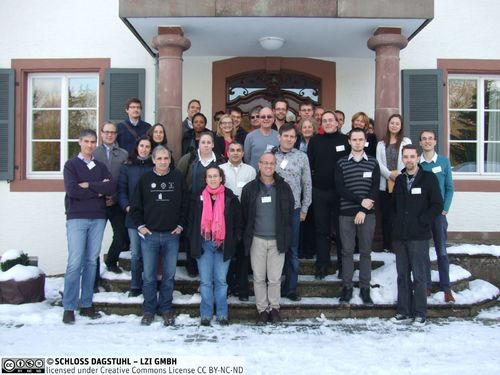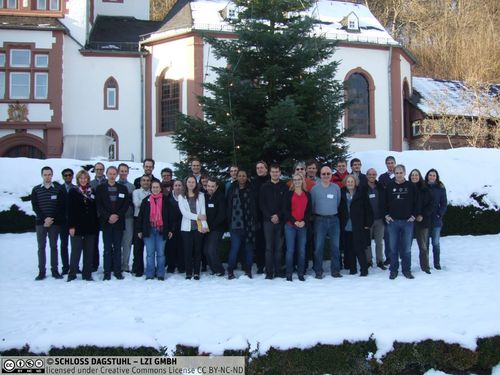Dagstuhl Seminar 12501
Organizational Processes for Supporting Sustainable Security
( Dec 09 – Dec 12, 2012 )
Permalink
Organizers
- Lizzie Coles-Kemp (Royal Holloway University of London, GB)
- Carrie Gates (CA Labs - Islandia, US)
- Dieter Gollmann (TU Hamburg-Harburg, DE)
- Jeffrey Hunker (Point Park University - Pittsburgh, US)
- Sean Peisert (University of California - Davis, US)
Contact
- Andreas Dolzmann (for scientific matters)
- Annette Beyer (for administrative matters)
The Dagstuhl seminar "Designing for process resilience to insider threats" was held on December 10--12th December, 2012 (Seminar #12501) to advance our understanding of ways of reducing insider threats through the design of resilient organizational processes.
The 2012 seminar built on the results of its predecessor from 2010 ( Insider Threats: Strategies for Prevention, Mitigation, and Response, #10341.) In this seminar we developed a shared, inter-disciplinary definition of the insider and a good formulation for a taxonomy or framework that characterizes insider threats. The seminar also began to explore how organizational considerations might better be incorporated into addressing insider threats.
The purpose of the 2012 seminar was to build on the understanding of the classification of the insider threat as a type of informed threat and the design requirements for tools and policies to respond to this category of threat that we had gained from the 2008 and 2010 Dagstuhl seminars on insider threats (Countering Insider Threats, #08302, and Insider Threats: Strategies for Prevention, Mitigation, and Response, #10341). Our goal was to explore what makes organizational processes resilient to insider threats. The exploration of organizational processes required us to consider the fluid set of informed actors against organizations whose processes and boundaries can be dynamic. It also required us to conceptualise threats and vulnerabilities as "emergent". The conclusions from the previous seminars had resulted in the insight that resilient organizational processes are more resilient with respect to insider threats and more capable of limiting the damage from insider attacks. We also had the insight that resiliency appears to stem from usable, effective, and efficient security having been built into the organizational processes.
The seminar participants contained a carefully balanced mix of social and computer scientists and practitioners in order to explore the technological, organizational and social dimensions of the organizational process and its implementation. In order to productively combine the skills of the different disciplines and perspectives represented, the seminar started with a series of provocations. Debi Ashenden presented a provocation about the competing and sometimes conflicting uses of gamefication in the UK military setting. Kai-Uwe Loser presented a grounded example of personal data management practices and the conflicting perceptions of policy compliance that emerged within the example. Trish Williams presented a provocation about the value of big data in the case of electronic health data.
These design principles reflect a start point for future work on the design of organizational processes that are sustainably secure. Seminar organizers intend to produce a book that extends and explores these principles.
- Julie Boxwell Ard (Glenn Dale, US)
- Florian Arnold (University of Twente, NL)
- Debi Ashenden (Cranfield Univ. - Swindon, GB) [dblp]
- Arshid Bashir (Royal Holloway University of London, GB)
- Sören Bleikertz (IBM Research GmbH - Zürich, CH) [dblp]
- Rainer Böhme (Universität Münster, DE) [dblp]
- Lizzie Coles-Kemp (Royal Holloway University of London, GB) [dblp]
- Sophie Engle (University of San Francisco, US)
- Vaibhav Garg (Indiana University - Bloomington, US) [dblp]
- Carrie Gates (CA Labs - Islandia, US) [dblp]
- Dieter Gollmann (TU Hamburg-Harburg, DE) [dblp]
- Marit Hansen (ULD SH - Kiel, DE) [dblp]
- Cormac Herley (Microsoft Corporation - Redmond, US) [dblp]
- Michael Huth (Imperial College London, GB) [dblp]
- Jean-Lous Huynen (University of Luxembourg, LU)
- Dan Ionita (University of Twente, NL)
- Florian Kammüller (Middlesex University - London, GB) [dblp]
- Ana Margarida Leite de Almeida Ferreira (University of Luxembourg, LU)
- Makayla Miranda Lewis (Royal Holloway University of London, GB)
- Kai-Uwe Loser (Ruhr-Universität Bochum, DE)
- Anne-Marie Oostveen (University of Oxford, GB)
- Wolter Pieters (TU Delft, NL) [dblp]
- Joachim Posegga (Universität Passau, DE) [dblp]
- Marco Prandini (University of Bologna, IT)
- Christian W. Probst (Technical University of Denmark - Lyngby, DK) [dblp]
- Ingrid Schirmer (Universität Hamburg, DE) [dblp]
- Sven Übelacker (TU Hamburg-Harburg, DE) [dblp]
- Sam Weber (NSF - Arlington, US) [dblp]
- Sean Whalen (Columbia University - New York, US)
- Trish Williams (Edith Cowan University - Joondalup, AU)
- Alf Zugenmaier (Hochschule München, DE)
Related Seminars
Classification
- Modelling/Simulation
- Security/Cryptology
- Society/HCI
Keywords
- Insider Threat
- Security Policies
- Threat Modelling



